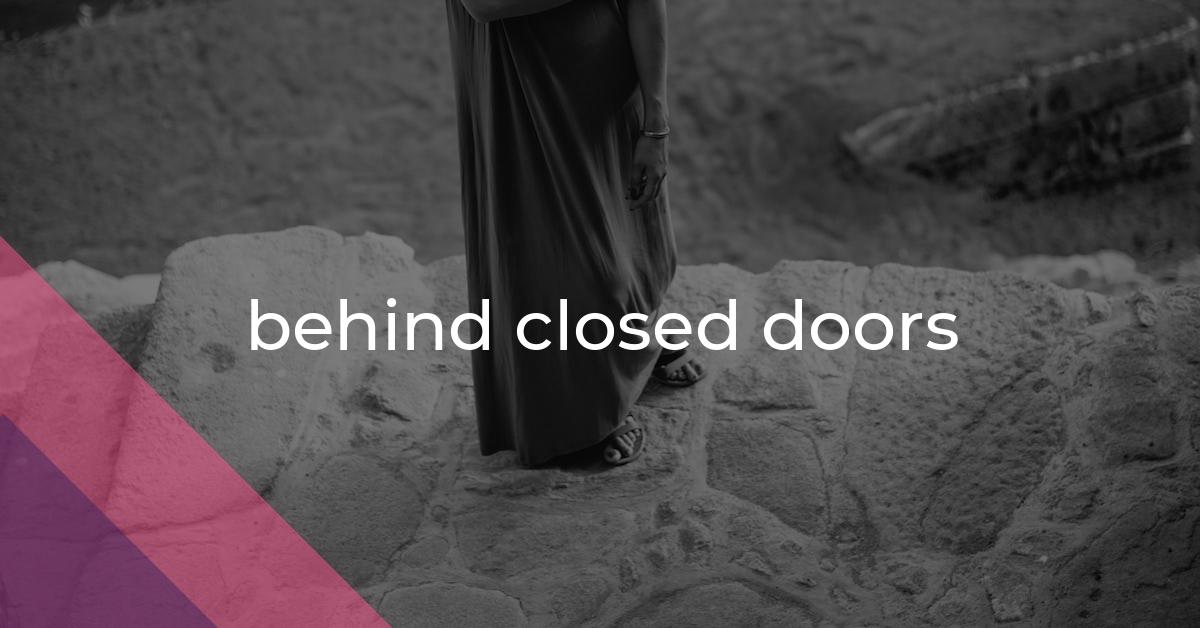behind closed doors: Idiom Meaning and Origin
What does ‘behind closed doors’ mean?
The idiom "behind closed doors" means that something happens privately or secretly, out of public view or knowledge.

Idiom Explorer
The idiom "laugh in one's sleeve" means to secretly or quietly find something amusing or funny without showing it openly.
The idiom "keep quiet" means to remain silent or not speak, especially when it is important to do so in order to maintain secrecy, avoid trouble, or not reveal information.
The idiom "keep one's lips sealed" means to keep quiet or not reveal a secret or confidential information.
The idiom "keep one's cards close to one's chest" means to keep one's thoughts, plans, or intentions secret or hidden in order to maintain an advantage or not reveal too much information.
The idiom "in the dark" means being unaware or uninformed about something, lacking knowledge or understanding. It is often used to describe a situation where someone is kept ignorant or intentionally left out of important information or events.
The idiom "hide in plain sight" means to conceal oneself or something in a way that is not obvious or easily noticed, even though it is in a highly visible or noticeable place.
The idiom "hidden in plain sight" means that something is not easily noticed or recognized, even though it is easily visible or apparent to everyone. It implies that the object or information is so commonly found that it remains unnoticed by most people.
The idiom "fly under the radar" means to go unnoticed or stay hidden from attention or detection, often to avoid scrutiny or to do something secretly or quietly.
The idiom "cover up" means to hide or conceal something, often a mistake or wrongdoing, in order to avoid being caught or facing consequences.
Unveiling the Hidden Realm
Behind closed doors is a commonly used idiom in English-speaking countries, including the United States. It means that something is done privately or secretly, away from the view or knowledge of others. The idiom is often used to describe situations where important discussions or decisions take place that are not meant for public knowledge or scrutiny. This idiom is related to two other idioms, "behind someone's back" and "behind the scenes."
The origins of the idiom can be traced back to the literal meaning of closed doors. In the past, doors were often closed to provide privacy and prevent others from entering a room or space. This act of closing doors came to symbolize the exclusion of others and the desire for confidentiality or secrecy. Over time, the metaphorical usage of closed doors developed, and the idiom "behind closed doors" emerged.
In political settings, important negotiations or discussions may take place behind closed doors. This allows for frank and confidential exchanges without the presence of the public. Closed-door meetings can prevent information leaks and maintain control over the narrative presented to the public. The idiom "behind closed doors" is often used to describe these political situations, where key decisions and conversations occur away from public knowledge.
In business, closed-door meetings or discussions are frequently held to address sensitive topics. These topics may include mergers and acquisitions, personnel matters, or strategic planning. Closed-door sessions provide an opportunity for open and honest conversations without immediate scrutiny or judgment from outside observers. The idiom "behind closed doors" is applicable in these business scenarios as well.
When it comes to personal relationships, the idiom "behind closed doors" also finds its place. It can refer to conversations or actions that are kept private or hidden from others. For instance, a couple might have a serious discussion or argument behind closed doors to address issues without involving or upsetting others. In these personal relationships, the idiom signifies the need for privacy and the desire to handle matters discreetly.
The idiom "behind closed doors" carries a sense of mystery and intrigue. It suggests that important or significant things are happening that are not immediately visible or accessible to the public. This can create a sense of curiosity and speculation, as people wonder what might be happening behind those closed doors. The related idioms "behind someone's back" and "behind the scenes" evoke a similar sense of secrecy and hidden actions.
The idiom "behind someone's back" means to do something without someone's knowledge or in secret. It implies a sense of betrayal or deceit, as actions are being taken without the person's awareness. This phrase is often used in negative contexts where someone is being talked about or betrayed in some way. It relates to the idiom "behind closed doors," as both imply actions or discussions taking place in secret or without public knowledge.
The idiom "behind the scenes" refers to the behind-the-scenes or behind-the-scenes work, which happens away from the public eye or view. It signifies the hidden or unnoticed work that contributes to the final outcome. This can be used to describe the efforts and activities that occur behind closed doors in various industries, such as film production, theater, or event planning. Like the idiom "behind closed doors," "behind the scenes" implies actions or work occurring away from public view.
The idiom "behind closed doors" originated from the literal act of closing doors for privacy and evolved to represent situations or discussions kept hidden from public view. Whether in politics, business, or personal relationships, this idiom conveys confidentiality and the potential for important events or decisions to unfold in secret. It leaves us with a curious desire to know what lies behind those closed doors. The related idioms "behind someone's back" and "behind the scenes" carry similar connotations of secrecy and hidden actions.
Example usage
Examples of how the idiom "behind closed doors" can be used in a sentence:
- They discussed the sensitive matter behind closed doors.
- I could hear them arguing behind closed doors.
- The negotiations took place behind closed doors.
More "Meaning" idioms



